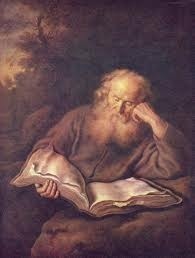Are you familiar with the term “bibliomancy?” I was probably in my thirties when I first came across it. I was going through an M.R. James reading phase, and was devouring his various ghost stories, quite greedily too, if the truth must be known. In his famous story, “the Ash Tree,” the character Mr. Crome is seeking on guidance on how to deal with the supernatural goings-on at Castringham Hall, picks up a bible and attempts the “old and by many accounts superstitious practice of drawing the sorts.” By this, the character means randomly opening the book and pointing his finger at the text to gain answers to questions that have been posed. The results of this practice in “The Ash Tree” are spot-on (once we later finish with the whole story) but I suspect some “literary license” was invoked to make them so.
(Below: MR James – A Titan of the Ghost Story genre)
Roughly defined, bibliomancy is “the use of books in divination,” and it seems that “sacred books” are preferred, though not required. I was reminded of this practice a few days ago, by a post by Nina at her Multo(Ghost) blog. She used a non-sacred text (as I did in the experiment I attempted on 11/1) and shared some of the results. I was surprised out how relevant the answers she got could be interpreted, and when I inquired if they were all the result of her “first cast” she elaborated that she had asked several other questions in addition to the three she wrote about and only shared the most reasonable. I decided to be harsher in my approach, giving only three chances. I chose for a text, my electronic copy of Jack London’s complete works. Checking in at just over 8,000 pages, it allowed me to pick random pages by dragging the progress bar back and forth a bit and then alighting wherever it landed. Here are my results:
Question 1: Should I try again to do this NaNoWriMo (National Novel Writing Month) thing, which I have failed at twice already?
“Every feature of the man told the same story, from the clear blue eyes to the full head of hair, light brown, touched with grey, and smooth parted and drawn straight across above the domed forehead.” (From the story “By The Turtles of Tasman”)
Analysis: Not that good of a “hit” unless I focus only onthe first few words “every feature of the man told the same story.” I could interpret this as either meaning 1) if I try again, it’ll be just the same old story of failure to stick with it or 2) My imagination is not robust enough to produce a high volume of creative output – all my stories are the same. Interesting…
Question 2: what should I do about my long standing Colts season tickets agreement?
“He was splendidly muscled and hard as steel, and there were innumerable stories in circulation among the fisher-folk regarding his prodigious strength. He was as bold and dominant of spirit as he was strong of body, and because of this he was widely known as ‘The King of the Greeks.'” (From the story “The King of the Greeks“)
Analysis: (background) I have shared 4-6 Colts tickets with a friend for many years. They are in her name so it has always been a handshake agreement. Frankly, I’m getting burned out and also more sensitive to the outrageous cost and financial impact. I’m thinking about making this my last year. Again not a very specific hit, but I found it interesting that the passage could be said to describe a promising athlete (Andrew Luck?) but he is described in the past tense (Peyton Manning?). Unfortunately, I don’t think it provides much in the way of advice on what to do – unless it is meant to remind me that the new “Luck Era” we are entering into is not something to be missed? Hmm…
Question 3: Any advice for the focus of my blog in 2014?
“Gradual as was my development as a heavy drinker among the oyster pirates, the real heavy drinking came suddenly, and was the result, not of desire for alcohol, but of intellectual conviction” (from the novel “John Barleycorn”)
Analysis: Now this one was interesting. I have gotten more and more involved in the book blogging community (clearly, these are the “oyster pirates?”) the past few years, and my progress has been quite gradual. I have often had the sense that I am in effect building toward something of a critical mass where the blogging will lead to something else. This may come suddenly (as the heavy drinking does in the text), I don’t know. It’s hard to spend too much time on blogging, but it IS true that it is somewhat hard to define “intellectual conviction” that drives me to continue.
So, all in all, a fun experiment that perhaps I shall repeat some day (maybe I’ll make it a November 1st tradition?). I think the benefit of the practice lies in how it nudges you to think a little abstractly about your questions in order to bring them into range of the text randomly chosen. The forging – or attempt at forging – those links was a pleasant mental exercise.
What about you? Have you ever heard of – or attempted – bibliomancy? Why don’t you give it a try and share your results on your blog. Leave a link in the comments if you do…
<Below: an ancient bibliomancer? (From an interesting blog post at New World Witchery )>


